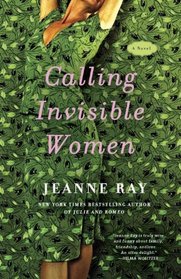Helpful Score: 1
Stepping out of the shower to find that the bathroom mirror no longer registers your reflection does tend to give one pause. In Calling Invisible Women, the author addresses issues of self-erasure and feminism in a sweetly humorous way.
The heroine, Clover Hobart, is a doctor's wife and mom of two young adults. She's at the age when a lot of women feel like they're invisible, anyway, but in her case it is literally true. It takes a couple of weeks before she is shocked to discover that she is not the only invisible woman, and in fact that several invisible women have been secretly meeting at a hotel conference room.
The premise would be the stuff of farce or satire or both, but in the author's hands it seems to be merely a premise that allows her main character to go anywhere and be the fly-on-the-wall on the school bus and in her husband's offices.
Along the way she busts up an attempted bank robbery, and orders her grown son to go home when he and a pal enter a tattoo parlor. Once she accepts that there is an upside to being invisible, she becomes fearless!
The invisible women's support group informs her that a certain combination of prescriptions commonly written for menopausal women is the likely precipitating factor in their condition. And how many millions of women will identify with these victims who take meds for osteoporosis, hot flashes, and depression? Lots, I bet.
Only very late in the novel does Clover finally meet a future son-in-law's mother, who is also invisible. She is more radical and insists on storming the gates of the pharmaceutical giant to get justice.
Clover's reporter instincts kick in first in writing a first-person account of the bank robbery while keeping her secret. Only later does she come out of the closet in a clarion call for all invisible women to unite against the corporate monster who did this to them.
It is a likable novel with sympathetic characters who do not waste much time on self-pity. Clover gains support first from her best friend and neighbor, Gilda, her mother-in-law, and other invisible women. Predictably, the men are all hopeless and do not even realize she has become invisible. That list includes her husband, son, and physician. Clover aggravates matters by passively waiting for them to realize what is wrong, though but once they become aware of her condition, they rally to her side.
The themes bear some resemblance to another book I recently reviewed, titled "Goodnight Nobody" -- though they are not really in the same class with each other. But feminists will find pleasure in both.
The heroine, Clover Hobart, is a doctor's wife and mom of two young adults. She's at the age when a lot of women feel like they're invisible, anyway, but in her case it is literally true. It takes a couple of weeks before she is shocked to discover that she is not the only invisible woman, and in fact that several invisible women have been secretly meeting at a hotel conference room.
The premise would be the stuff of farce or satire or both, but in the author's hands it seems to be merely a premise that allows her main character to go anywhere and be the fly-on-the-wall on the school bus and in her husband's offices.
Along the way she busts up an attempted bank robbery, and orders her grown son to go home when he and a pal enter a tattoo parlor. Once she accepts that there is an upside to being invisible, she becomes fearless!
The invisible women's support group informs her that a certain combination of prescriptions commonly written for menopausal women is the likely precipitating factor in their condition. And how many millions of women will identify with these victims who take meds for osteoporosis, hot flashes, and depression? Lots, I bet.
Only very late in the novel does Clover finally meet a future son-in-law's mother, who is also invisible. She is more radical and insists on storming the gates of the pharmaceutical giant to get justice.
Clover's reporter instincts kick in first in writing a first-person account of the bank robbery while keeping her secret. Only later does she come out of the closet in a clarion call for all invisible women to unite against the corporate monster who did this to them.
It is a likable novel with sympathetic characters who do not waste much time on self-pity. Clover gains support first from her best friend and neighbor, Gilda, her mother-in-law, and other invisible women. Predictably, the men are all hopeless and do not even realize she has become invisible. That list includes her husband, son, and physician. Clover aggravates matters by passively waiting for them to realize what is wrong, though but once they become aware of her condition, they rally to her side.
The themes bear some resemblance to another book I recently reviewed, titled "Goodnight Nobody" -- though they are not really in the same class with each other. But feminists will find pleasure in both.




